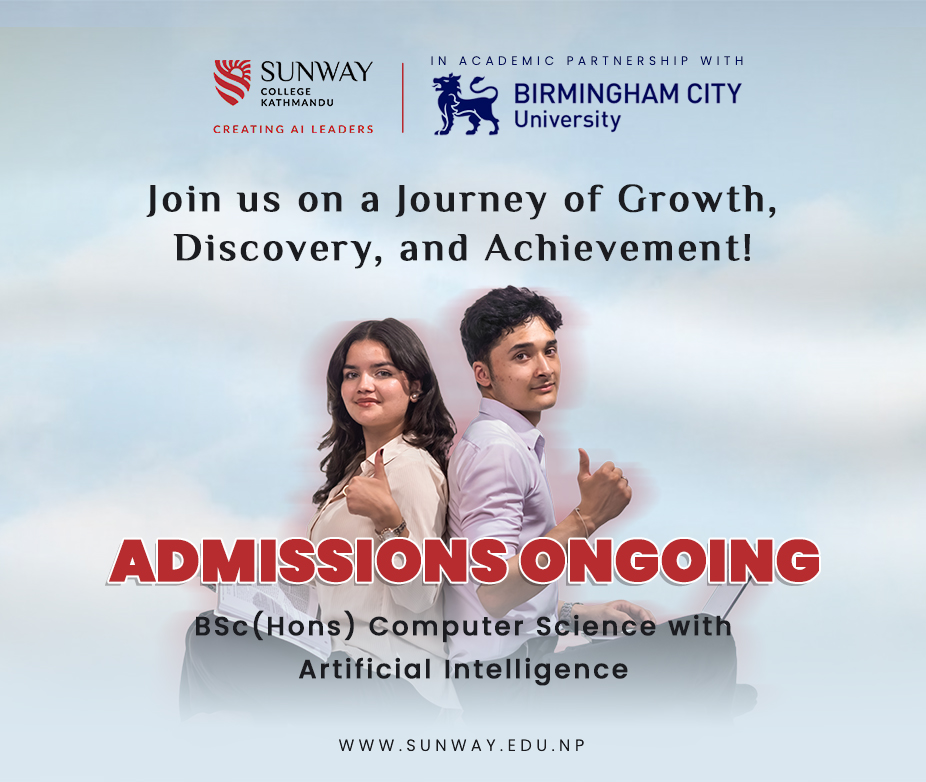BSc (Hons) Computer Science with Artificial Intelligence

-
Duration
3 Years -
Credits
360 -
Intake
Spring/Autumn
BSc (Hons) Computer Science with Artificial Intelligence course integrates foundational computer science and AI expertise, emphasizing computational thinking, programming, and advanced AI techniques for a versatile skill set in technology.
-
Admission Eligibility
Minimum 2.4 GPA in 10+2 level or 3.5 Credit in A level (Science / Management / Humanities).
-
English Requirement
The students with valid IELTS Report Forms with a 6.0 overall band or equivalent are eligible to apply.
Overview
The Computer Science with AI course programme combines foundational computer science knowledge with a specialized focus on Artificial Intelligence (AI). Designed to cultivate technical expertise and transferable skills, the curriculum spans traditional areas like software development and database maintenance, as well as emerging fields influenced by AI. Emphasizing computational thinking and practical programming, students explore cutting-edge AI techniques, delve into system architecture, and engage in data science with large datasets and modern machine learning algorithms. The course also integrates industry tools, ethical considerations, and collaborative projects, preparing graduates for diverse careers or further studies. Upon completion, students gain a well-rounded skill set encompassing computational thinking, programming, system architecture, data science, software development, professional practices, and advanced AI applications, positioning them for success in the evolving landscape of technology.
Specializations
The Computer Science with Artificial Intelligence (AI) course aims to equip you with all the knowledge and skills you need to become an AI specialist in the computing industry.
- Explore artificial intelligence and its relationship to machine learning, parallel programming, and data science, and learn how these areas drive innovation and change in the domain of computer science.
- Master the practical skills and theoretical knowledge to develop software solutions that address demanding user expectations and complex customer requirements.
- Gain industry-relevant experience as you apply real-world, software development practices within teams of your peers, preparing you for your AI specialist career after graduation.
Fee Structure
| Particular | 1st Year | 2nd Year | 3rd Year |
|---|---|---|---|
| Admission Fee | 40,000/- | - | - |
| Annual Fee | 35,000/- | 35,000/- | 35,000/- |
| CCA Fee | 20,000/- | 20,000/- | 20,000/- |
| Semester 1 Fee | 1,11,000/- | 1,11,000/- | 1,11,000/- |
| Semester 2 Fee | 1,11,000/- | 1,11,000/- | 1,11,000/- |
| University Regd. Fee | (GBP 1060) ~1,80,200/- | (GBP 800) ~1,36,000/- | (GBP 800) ~1,36,000/- |
| Total | 4,97,200/- | 4,13,000/- | 4,13,000/- |
| Grand Total(NPR) | 13,23,200/- |
Notes:
- University Registration Fee may vary in the upcoming years as per the university’s policy &Nepal Government tax policy.
- The University Registration Fee is subject to change as per the prevailing foreign exchange rate set by the commercial bank. The University Registration Fee in the fee structure is set at 1£= NRS 170.
Degree Highlights
- Programming proficiency in various languages
- Focus on data science with large datasets
- Development of transferable skills
- Career-ready with a holistic skill set
Career Opportunities
- AI Software Developer
- Data Scientist
- Software Engineer
- System Architect
- AI Researcher
- Project Manager
- Data Engineer
Modules
Semester 1
Programming and Algorithms
Introduction to programming, Algorithmic problem solving, Version control, testing. Recursive functions, error handling, data structures (e.g., arrays, associate arrays) and their use to solve problems. Boolean logic, basic algorithmic complexity, distinguishing different programming languages, classification of errors.
Software Design
Introduction to Software design principles, Agile methodology, Design Patterns (Factory, proxy, singleton etc.), Version Control, Unit and Integrati45+on Testing, TDD, BDD, UML and use of RESTful APIs.
Database Systems
Database Systems is designed to provide students with a comprehensive understanding of database management systems, data modeling, and database design principles. Students will gain hands-on experience with popular database management systems and learn how to design, implement, and manage databases effectively.
Computer Science Activity Led Learning Project 1
Develop and understand algorithms to solve problems, measure and optimize algorithm complexity. Working with storage technology and applying statistical analysis to draw meaningful conclusions and use machine learning tools to discover hidden patterns.
Semester 2
Object Oriented Programming
Introduction to OOPs features (Encapsulation, Information hiding, classes and Inheritance). Arrays, Linked lists, stacks, lambda, callbacks and iterators.
Computer Architecture and Networks
Computer hardware and architecture, memory devices, logic gates, CPU instruction sets, Parallel processing, Networking, OSI and TCP/IP model.
Creative Thinking for Business
Identify business opportunities, understand business models, creative problem solving and develop creative culture.
Mathematics for Computer Science
Introduction to the basic notions of logic and sets, and then builds on that by applying these ideas to a variety of problems arising in discrete mathematics, showing applications in Computing.
Computer Science Activity Led Learning Project 2
Students engage in group projects emphasizing teamwork and problem-solving skills. The course includes regular collaboration, supervisor meetings, presentations, and individual examinations to assess their progress and learning.
Semester 1
Introduction to Artificial Intelligence
Machine learning basics, Search Algorithms, NLPs, AI ethics, AI tools and frameworks, AI applications, and Computer Vision.
Software Engineering
Requirements Engineering, Software Design, Programming and coding, Testing and QA, Software project management, Software maintenance and evolution, Software Documentation.
Theory of Computation
Automata Theory, Turing Machines, Decidability and Undecidability, Formal Language Theory, Computational Complexity, Applications of Computational Theory
Be Your Own Boss
Feasibility study of a new business, market research, competitor analysis, developing financial planning, developing entrepreneurial mind-set and skills, and business model development.
Semester 2
Advanced Algorithms
Advanced Data structures (Trees, graphs and heaps), Algorithm Design and Techniques (Divide and conquer algorithms, Dynamic programming and memorization, greedy algorithms, backtracking and branch and bound techniques), Graph Algorithms, Advanced sorting and searching, Complexity and Analysis.
Operating Systems and Security
Addresses core operating system functions and their role in implementing security features, safeguarding against threats, and maintaining system integrity through various mechanisms.
Data Science
The Data Science module extends your data skills by introducing Big Data concepts and advanced tools, including predictive modeling and data visualization for clear communication of analysis results.
Big Data Programming Project
Course equips students with hands-on experience in using cutting-edge tools like Hadoop, Spark, SQL/NoSQL databases, and programming languages (Python, R, Scala, Java) for large-scale data handling. It also covers statistical and machine learning algorithms for data analysis and involves practical projects to apply these skills.
Semester 1
Individual Project Preparation
Identify and refine a project topic and research question, an initial literature review, create a detailed, achievable project plan. Consider social, legal, and ethical impacts of the research.
Machine Learning and Related Applications
Offers a holistic approach to machine learning, combining theory and practical application with Python tools and real data. Students gain hands-on experience and understanding of topics like linear and logistic regression, support vector machines, decision trees, and model evaluation. Additionally, it covers unsupervised learning, bias-variance tradeoff, and ethical aspects of machine learning.
Design Thinking and Innovation
Enhance individual and teamwork to focus on solving complex problems and find the most appropriate solution for the end user. Entrepreneurship and design thinking, business applications of design thinking, creativity and innovation, business feasibility and personal entrepreneurial assessment.
Neural Networks
Provides a comprehensive overview of artificial neural networks, focusing on their core concepts and real-world applications. Students will learn to design and implement neural network models. Topics covered include various network types, data handling, deep learning, and their applications in fields like vision, speech, and robotics. The course also discusses neural network simulators, limitations, and emerging trends.
Semester 2
Individual Project
Conduct in-depth research on a Computer Science topic, culminates in a technical project and written report, Supervisor meetings to review progress.
Security
Introduction to fundamental security concepts such as cryptography, infrastructure security, and secure programming. Students learn to analyze systems and create secure environments. The content covers cryptography (ciphers, hashes, PKI, digital signatures), infrastructure security (policies, network security, audits), secure development (defensive coding).
Intelligent Agents
Delves into core AI concepts, including search algorithms, knowledge representation, and planning. Students gain hands-on experience applying these techniques to problem-solving tasks. The curriculum also covers probabilistic reasoning and decision-making in uncertain scenarios
Why Birmingham University?
As per 2022, World University Rankings by Times Higher Education that uses 13 performance indicators, Birmingham City University is ranked 501-600 and is positioned as 12th out of the 100 UK universities ranked. Birmingham City University is also ranked 90th in the QS World University rankings 2022, maintaining the position of the top 100 universities globally and as the top 14th university amongst UK universities. Shanghai Jiao Tong University World Rankings ranked Birmingham as being in the top 101 – 150 (calculated rank 126th) out of 500 universities, establishing us as 12th out of the 36 UK universities to appear in the top 500.
Disclaimer: We regularly review our course content, to make it relevant and up-to-date for the benefit of our students. For these reasons, course modules may be updated, please contact us for the latest information.

